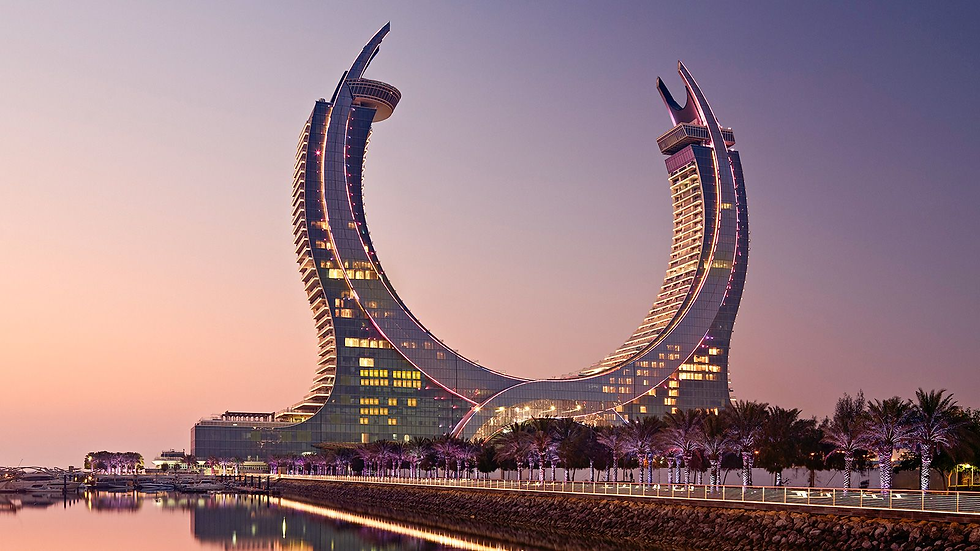Qatar Hospitality: Thriving Luxury & Innovation by example of Fairmont Doha
- 360° Agency Middle East

- Jun 17, 2024
- 3 min read
Qatar's Thriving Hospitality Sector: A Blend of Luxury, Culture, and Innovation
The Qatar Hospitality Fair at the Fairmont Doha showcases the pinnacle of luxury and service excellence in the hospitality industry. Qatar, the wealthy peninsular nation in the Middle East, is rapidly establishing itself as a premier global destination for luxury, culture, and innovation. The country’s strategic investment in its hospitality sector, driven by the ambition to diversify its economy and prepare for events like the 2022 FIFA World Cup, has led to a significant transformation. From opulent hotels and diverse dining options to cutting-edge business ventures, Qatar’s hospitality scene is flourishing. This article explores the key aspects of Qatar’s thriving hospitality industry and its impact on the nation’s economy and global standing.
Luxurious Accommodations
High-End Hotels and Resorts: Qatar is home to some of the world's most luxurious hotels and resorts, offering unparalleled levels of comfort and sophistication. Iconic establishments like The Ritz-Carlton, Doha, and the St. Regis Doha set the benchmark for luxury, providing guests with lavish accommodations, world-class amenities, and impeccable service. The newly opened Banyan Tree Doha blends contemporary design with traditional Qatari elements, creating a unique experience that caters to both leisure and business travelers.
Expanding Hotel Industry: The Qatari government has been actively encouraging the development of new hotels to meet the increasing demand from international visitors. This expansion is part of the Qatar National Vision 2030, which aims to diversify the economy and enhance the country's tourism sector. With a growing portfolio of high-end hotels and resorts, Qatar is well-positioned to accommodate the influx of tourists and business travelers.
Culinary Excellence
Diverse Dining Scene: Qatar’s culinary landscape reflects its multicultural population and global outlook. From Michelin-starred restaurants to local eateries, the dining options in Qatar are vast and varied. High-end establishments such as Nobu Doha and Hakkasan offer exquisite international cuisine in sophisticated settings, while local restaurants serve traditional Qatari dishes like machbous and harees, providing an authentic taste of the region.
Celebrity Chefs and Gastronomy Festivals: The presence of renowned celebrity chefs and the hosting of gastronomic events have elevated Qatar's culinary profile. The annual Qatar International Food Festival attracts food enthusiasts from around the world, showcasing the nation’s culinary diversity and innovation. Such events not only boost tourism but also position Qatar as a gastronomic hub in the Middle East.
Cultural and Entertainment Attractions
Museums and Cultural Centers: Qatar’s rich cultural heritage is showcased through its world-class museums and cultural centers. The Museum of Islamic Art, designed by renowned architect I.M. Pei, houses an extensive collection of Islamic art from around the world. The National Museum of Qatar, designed by Jean Nouvel, offers an immersive journey through the country’s history and culture. These institutions attract cultural tourists and contribute to Qatar’s reputation as a center for arts and culture in the region.
Entertainment and Sports: Qatar’s investment in entertainment and sports infrastructure has made it a top destination for major international events. The successful hosting of the 2022 FIFA World Cup showcased Qatar’s capabilities in organizing large-scale events. Additionally, venues like the Aspire Zone, Katara Cultural Village, and Souq Waqif offer a range of entertainment options, from sports and concerts to traditional markets and festivals.
Business and Innovation
Business Tourism: Qatar’s strategic location, combined with its modern infrastructure and high-quality hospitality services, makes it an attractive destination for business tourism. The Qatar National Convention Centre and Doha Exhibition and Convention Centre host numerous international conferences, exhibitions, and trade shows, attracting business travelers from across the globe. These events boost the local economy and foster international business relationships.
Innovation and Sustainability: Qatar is committed to sustainable development and innovation in the hospitality sector. Many hotels and resorts incorporate eco-friendly practices, such as energy-efficient systems, waste reduction programs, and sustainable sourcing of materials. The country’s focus on green building standards and smart technologies enhances its appeal to environmentally conscious travelers and investors.
Future Prospects
Continued Growth and Development: The future of Qatar’s hospitality sector looks promising, with continued investments in infrastructure, tourism, and entertainment. The development of new attractions, such as the Lusail City and the Doha Metro, will further enhance the visitor experience. The country’s commitment to hosting international events, including the upcoming Asian Games, will continue to drive growth in the hospitality industry.
Global Connectivity: Qatar Airways, the nation’s flagship carrier, plays a crucial role in boosting tourism by providing extensive global connectivity. The award-winning airline connects Doha to major cities around the world, making it easier for tourists and business travelers to visit Qatar. The expansion of Hamad International Airport, one of the world’s most advanced airports, further supports this connectivity and enhances the overall travel experience.





Comments